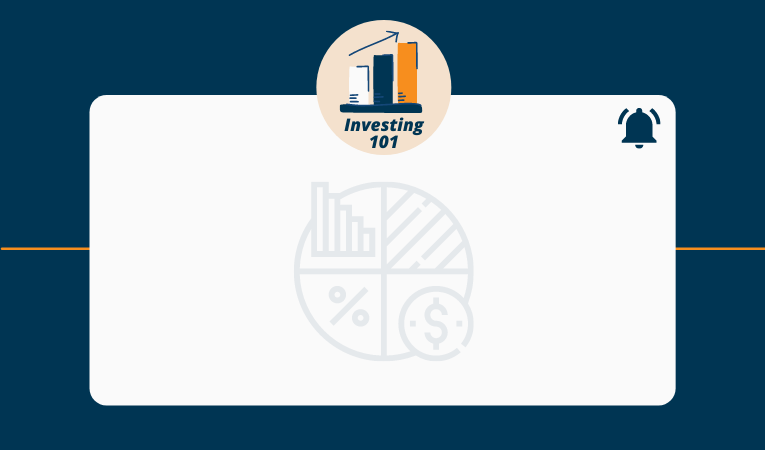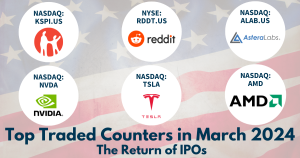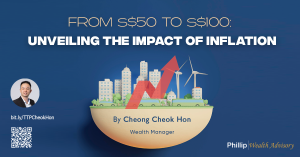Investing 101 Part 4: 10 Types of Investments for Beginners July 21, 2021

What this report is about:
- Apart from stocks and shares, investors can trade a host of other financial instruments for portfolio diversification.
- These range from ETFs to unit trusts, CFDs, bonds, money market funds, forex, futures and even Phillip SMART Portfolios and Managed Accounts.
Stock news is all over the newspapers or TV each day, but can you name other tradable securities besides stocks? There are other types of investments that are heavily traded, and some may be particularly suitable for beginners.
Back in 2017, Bloomberg had already reported that individual stocks were no longer the most popular type of investment. Instead, passive investments such as ETFs were increasingly traded.
What are ETFs? Are there other financial instruments that one can hold?
If you have stuck with us through this series, you may have researched some investments, selected a trading platform and even purchased an asset or two. Today’s Investing 101 introduces 10 types of investments for new investors. If you are still assembling your portfolio, this article is for you!
1. Stocks and initial public offerings (IPOs)
Stocks are shares that give stockholders part-ownership of a company. Stockholders are entitled to the future profits and assets of the company whose stock you own. In most cases, these profits are distributed in the form of dividends. However, not ALL stocks issue dividends, and you should check if you are investing for dividends!
New stocks are listed on exchanges all the time. Initial public offerings or IPOs are the first step for a company to become publicly listed. The company issues shares that can be traded on the stock exchange. In the process, the company raises funds from a larger pool of investors
Click here to discover how you can purchase Hong Kong shares one day before they are listed on the Hong Kong Exchange.
Recommended reads:
- Rule of 40 for Stock Selection
- The Ultimate Guide to Trading and Investing in Stocks Listed on HKEX
- 3 Takeaways on Grab’s SPAC IPO
- Here’s Why You Should Trade Stocks with POEMS
2. Exchange-traded funds (ETFs)
Exchange-traded funds or ETFs are investment funds that are listed on a stock exchange. Investors can buy ETFs the same way they buy shares.
ETFs invest in assets which mimic an index that is more representative of a particular market. For instance, the SPDR STI ETF tracks the top 30 companies listed on the Singapore Exchange.
The underlying assets of an ETF may also have a common theme such as electric vehicles. Thematic or sector ETFs are perfect for investors who see the potential for growth in an industry but are unsure which firms to invest in.
To diversify one’s portfolio, investors usually trade multiple stocks and pay commissions for each transaction. ETFs help you diversify your portfolio by purchasing a single asset. In other words, you gain exposure to the benefits of diversification at a lower cost!
Recommended reads:
- How to Prepare Your Portfolio for Rising Interest Rates
- Read More about Thematic Portfolios here!
- Learn More about ETFs
3. Unit trusts
Wondering what the difference is between unit trusts and ETFs? ETFs are typically pegged to an index or an industry. Unit trusts pool the funds of multiple investors and empower a fund manager to make investment decisions on their behalf.
Whereas ETFs are usually passively-managed funds that track stock indices, unit trusts are actively managed by the fund managers. These fund managers monitor the market and conduct research to pick securities they think can outperform the market. Because of such active management, unit trusts generally charge higher management fees.
ETFs are also traded like a stock throughout the day on a stock exchange. Unit trusts trade at their net asset value at the end of each trading day.
Find out more about unit trusts here!
4. Contracts for Differences (CFDs)
Contracts for Differences or CFDs are contracts between two parties to trade on the difference between an entry price and the closing price of an asset.
If the closing trade price of the asset is higher than its opening price, the seller will pay the buyer the difference. That is the buyer’s profit.
If the closing price is lower than the opening price, the seller, rather than the buyer, benefits from the difference.
Traders who hold CFDs do not own the actual underlying assets. Instead, they invest a small amount of capital to profit from anticipated price movements and price differentials of the asset.
CFDs are a derivative product that provides investors with exposure to a whole range of financial instruments such as shares, forex, stock indices and commodities without having to take ownership of their underlying assets.
For instance, a trader could invest S$100 in a CFD that offers returns on S$1,000 worth of stocks. If the stock value rises to S$1,200, the trader receives the DIFFERENCE of S$200 on the initial S$100 capital. Sounds great, right? However, if the stock value falls to S$900, the trader loses S$100 or all of his initial capital!
Recommended reads:
- Understanding Contracts for Differences (CFD)
- Is CFD For You?
- Short-Selling with CFDs – Profit Your Position During a Bear Market
Of course, CFDs are more complicated than what we present here. Click here to find out more!
5. Bonds
Bonds are debt securities whereby investors lend money to an entity. The bond issuer is obligated to repay the bondholder a fixed sum of money after a predetermined period. In exchange, investors receive periodic interest payments.
Compared to stocks, bonds tend to be less volatile and risky because coupon rates are fixed at the time of bond issue. Under this arrangement, investors receive stable and consistent returns on their investments.
Recommended reads:
- Bond ETFs: A Simple and Efficient Bond Investment Option
- The Complete Guide to Wholesale Corporate Bonds in Singapore
- Find Out Why You Should Trade Bonds with POEMS
6. Excess funds and money market funds
Excess funds are funds held in your brokerage account that are not currently used for investments. Some brokerages may offer interest on excess funds to ensure that your money generates SOME income even as it sits idle.
Did you know that POEMS account holders can opt for automatic investment of their balance funds in Phillip’s money market fund? Learn more about excess fund management here!
7. Forex
Forex is short for foreign exchange, traded in a forex market. Here, traders buy or sell currencies at an agreed exchange price. While stock markets have stipulated trading hours, traders can trade forex 24 hours a day five days a week. Click here to find out how you can trade forex!
8. Futures
Futures are contracts where the parties involved are obligated to buy or sell an asset at a pre-specified date and price.
When an investor purchases a futures contract to buy an asset at a predetermined price, the investor profits when the asset’s price increases beyond the predetermined price. Suppose that you purchase a futures contract with an obligation to buy an asset at S$100. If the asset price rises to S$110, your futures contract obliges you to purchase the asset at S$100, giving you a S$10 profit!
Conversely, investors who purchase a futures contract to sell an asset at a predetermined price benefits when its price falls below the predetermined price.
Wondering why anyone would want to trade futures when they can purchase an asset directly? Futures hedge investors against volatile prices. For instance, an investor who purchases an asset may also purchase a futures contract with the obligation to sell the asset at a predetermined price. So even if the price of the asset falls below the predetermined price of the futures contract, the investor limits his/her downside risks since he/she still sells the asset at the higher, predetermined price.
Recommended reads:
- A Beginner’s Guide to Profit from FX Swap Points
- What You’re Missing Out If You’re Not Trading Oil!
- Read more about futures here!
9. Phillip SMART Portfolios
Overwhelmed by the investment choices listed above?
Check out our Phillip SMART Portfolios that assess your risk preferences through a questionnaire. Once you have answered all the questions, our SMART portfolios will assign you a portfolio that matches your investment objectives and profile.
These portfolios are managed by Phillip SMART Portfolio managers who periodically rebalance the investment holdings across asset classes. SMART portfolios are perfect vehicles for investors who prefer to entrust someone else to manage their funds on their behalf rather than continuously research investments.
Click here to understand how a Phillip SMART Portfolio can build your portfolio for a low management fee and ZERO brokerage or platform fees!
10. Managed Accounts
Need a more personalised investment portfolio than what SMART portfolios can offer? Phillip’s Managed Accounts research global markets to help clients decide how best to invest their funds. This service is particularly attractive to those who lack the time to invest and would prefer portfolio managers to manage their investments on a discretionary basis.
Check out Phillip’s Managed Accounts that give investors direct ownership of a diversified portfolio of stocks, ETFs, unit trusts and other assets!
Snapshot of the 10 Types of Investments for Beginners
To recap, the following are the 10 investments that all new investors should know:
1. Stocks and IPOs
2. ETFs
3. Unit trusts
4. CFDs
5. Bonds
6. Excess funds and money market funds
7. Forex
8. Futures
9. SMART Portfolios
10. Managed Accounts
If you are still contemplating which assets to include in your portfolio, you may want to research the asset classes in this list. Who knows? There could be a range of assets that match your risk preferences better than mere equities!
For more information on each asset class, view the recommended resources under each section.
Whenever you are ready, open a POEMS account or speak to one of our licensed representatives to find out more.
Alternatively, join our Global Markets Investment Community on Telegram to share your thoughts with us and other like-minded investors!
References
- Market Journal
- Investopedia
- ETFs Versus Unit Trusts: What Should You Invest In? published in Yahoo Finance
- Stocks Are No Longer the Most Actively Traded Securities in Stock Markets published on Bloomberg, 2017
- Contract for Difference (CFD) published in Corporate Finance Institute
Disclaimer
These commentaries are intended for general circulation. It does not have regard to the specific investment objectives, financial situation and particular needs of any person who may receive this document. Accordingly, no warranty whatsoever is given and no liability whatsoever is accepted for any loss arising whether directly or indirectly as a result of any person acting based on this information. Opinions expressed in these commentaries are subject to change without notice. Investments are subject to investment risks including the possible loss of the principal amount invested. The value of the units and the income from them may fall as well as rise. Past performance figures as well as any projection or forecast used in these commentaries are not necessarily indicative of future or likely performance. Phillip Securities Pte Ltd (PSPL), its directors, connected persons or employees may from time to time have an interest in the financial instruments mentioned in these commentaries. Investors may wish to seek advice from a financial adviser before investing. In the event that investors choose not to seek advice from a financial adviser, they should consider whether the investment is suitable for them.
The information contained in these commentaries has been obtained from public sources which PSPL has no reason to believe are unreliable and any analysis, forecasts, projections, expectations and opinions (collectively the “Research”) contained in these commentaries are based on such information and are expressions of belief only. PSPL has not verified this information and no representation or warranty, express or implied, is made that such information or Research is accurate, complete or verified or should be relied upon as such. Any such information or Research contained in these commentaries are subject to change, and PSPL shall not have any responsibility to maintain the information or Research made available or to supply any corrections, updates or releases in connection therewith. In no event will PSPL be liable for any special, indirect, incidental or consequential damages which may be incurred from the use of the information or Research made available, even if it has been advised of the possibility of such damages. The companies and their employees mentioned in these commentaries cannot be held liable for any errors, inaccuracies and/or omissions howsoever caused. Any opinion or advice herein is made on a general basis and is subject to change without notice. The information provided in these commentaries may contain optimistic statements regarding future events or future financial performance of countries, markets or companies. You must make your own financial assessment of the relevance, accuracy and adequacy of the information provided in these commentaries.
Views and any strategies described in these commentaries may not be suitable for all investors. Opinions expressed herein may differ from the opinions expressed by other units of PSPL or its connected persons and associates. Any reference to or discussion of investment products or commodities in these commentaries is purely for illustrative purposes only and must not be construed as a recommendation, an offer or solicitation for the subscription, purchase or sale of the investment products or commodities mentioned.
About the author
Ng Ming Qian (Intern) & Joel Lim (ETF Specialist)
Ming Qian is an intern from the Global Markets Desk at Phillip Securities and an Economics Undergraduate at the National University of Singapore. Outside of school, Ming Qian hustles as a freelance writer and blogger who simplifies complex topics for readers. When he is not writing or buried in his books, you can probably find him tending to his aroid plants or bingeing on Grey’s Anatomy.
Joel is the ETF Specialist from the ETF desk in Phillip Securities. He helps to provide sales support and trading ideas to retail investors, remisiers, in-house dealers, and fund managers. Joel also works closely with ETF issuers on new product and business development projects.

 Back in Business: The Return of IPOs & Top Traded Counters in March 2024
Back in Business: The Return of IPOs & Top Traded Counters in March 2024  From $50 to $100: Unveiling the Impact of Inflation
From $50 to $100: Unveiling the Impact of Inflation  Japan’s Economic Resurgence: Unveiling the Tailwinds Behind Nikkei 225’s Record Leap
Japan’s Economic Resurgence: Unveiling the Tailwinds Behind Nikkei 225’s Record Leap  How to soar higher with Positive Carry!
How to soar higher with Positive Carry! 









